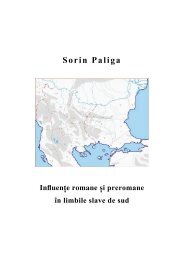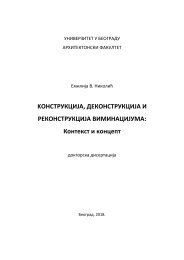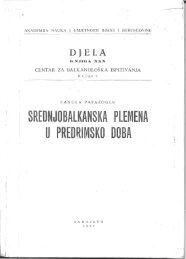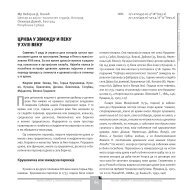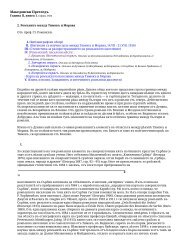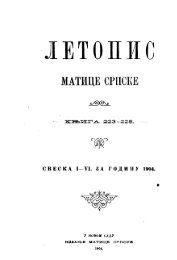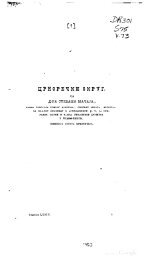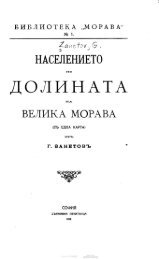The Construction of National Identity and its Challenges in Post-Yugoslav Censuses
Create successful ePaper yourself
Turn your PDF publications into a flip-book with our unique Google optimized e-Paper software.
<strong>The</strong> <strong>Construction</strong> <strong>of</strong> <strong>National</strong> <strong>Identity</strong> <strong>and</strong> <strong>its</strong> <strong>Challenges</strong> 899<br />
<strong>The</strong> contestations we have explored reflect both <strong>in</strong>stances <strong>of</strong> the erosion or challenges to<br />
ethno-national categories, as well as processes <strong>in</strong> which new (or redef<strong>in</strong>ed) categories emerge.<br />
<strong>The</strong> long trajectory might follow divergent paths: some might follow larger global trends<br />
<strong>of</strong> hybrid <strong>and</strong> hyphenated identities, while others might shift toward more consolidated<br />
ethno-national identity categories.<br />
Conclusion<br />
This article has argued that censuses are sites <strong>of</strong> negotiat<strong>in</strong>g national identities between<br />
state, ethnic entrepreneurs, <strong>and</strong> citizens. <strong>The</strong> categories that are proposed <strong>and</strong> campaigned<br />
over suggest particular identity packages that conflate ethnic identity with mother tongue<br />
<strong>and</strong> religion. <strong>The</strong> study <strong>of</strong> contestation <strong>of</strong> the post-<strong>Yugoslav</strong> censuses suggests that <strong>in</strong> order<br />
to underst<strong>and</strong> how ethnicity is reproduced, we need to focus not only on competition<br />
<strong>and</strong> conflict between groups, their political representatives, <strong>and</strong> the state, but also on the<br />
mechanisms through which these ethnic entrepreneurs dem<strong>and</strong>, request, <strong>and</strong> suggest loyalty<br />
<strong>and</strong> group cohesion, as well as the extent to which citizens respond.<br />
<strong>The</strong> response varies across the region. Kosovo has the most rigid ethno-national boundaries,<br />
with few citizens opt<strong>in</strong>g out <strong>of</strong> the established identity packages <strong>in</strong> the census. Ethnic<br />
polarization <strong>and</strong> territorialization, as well as the relatively clear “objective” markers <strong>of</strong> dist<strong>in</strong>ction<br />
between key groups, re<strong>in</strong>force more rigid categories <strong>of</strong> identity. Croatia, on the<br />
other h<strong>and</strong>, is also an example <strong>of</strong> a state with a strong dom<strong>in</strong>ant national identity <strong>and</strong> little<br />
contestation over national identity. Most “opt<strong>in</strong>g out” occurs here as expressions <strong>of</strong> s<strong>of</strong>t<br />
hybrid identities, namely, <strong>in</strong> regard to religion, where nearly 5 percent <strong>of</strong> the population<br />
identify as agnostics or atheists. Serbia, on the other h<strong>and</strong>, has more stable religious identities<br />
<strong>and</strong> the contestation occurs mostly with<strong>in</strong> m<strong>in</strong>orities, either between different identity<br />
categories (Muslim-Bosniak, Croat-Bunjevac, or Vlach-Romanian) or between the majority<br />
<strong>and</strong> m<strong>in</strong>orities when it comes to citizens identify<strong>in</strong>g with a m<strong>in</strong>ority identity, but not<br />
language. F<strong>in</strong>ally, Serbia also has a significant number <strong>of</strong> citizens who do not claim to have<br />
any national identity. Montenegro has the largest degree <strong>of</strong> “opt<strong>in</strong>g out” with 6 percent<br />
<strong>of</strong> the population reject<strong>in</strong>g the dom<strong>in</strong>ant categories <strong>of</strong> national identity, over 20 percent<br />
reject<strong>in</strong>g the presumed l<strong>in</strong>k between national identity <strong>and</strong> language, <strong>and</strong> 5 percent the<br />
l<strong>in</strong>k between nation <strong>and</strong> religion. <strong>The</strong> study <strong>of</strong> census category mak<strong>in</strong>g, <strong>and</strong> the response<br />
<strong>of</strong> citizens, thus helps to map out the rigidity <strong>of</strong> identity <strong>in</strong> the perception <strong>of</strong> the state as<br />
census makers <strong>and</strong> the citizens as respondents to the census.<br />
Furthermore, this article demonstrates that a significant number <strong>of</strong> citizens <strong>in</strong> most<br />
countries <strong>of</strong> the region do not fit, or want to fit, <strong>in</strong>to the ethno-national identity categories<br />
that states, political parties, <strong>and</strong> ethnic entrepreneurs promote. <strong>The</strong> census constitutes the<br />
most rigid test <strong>of</strong> identity, as <strong>in</strong>dividuals have to name their national identity, religion, <strong>and</strong><br />
language to a stranger who represents the state, subversion is discouraged, <strong>and</strong> public debates<br />
focus on choos<strong>in</strong>g the right identity. Mak<strong>in</strong>g choices that subvert the ethno-nationalist<br />
paradigm is heavily discouraged <strong>in</strong> the public discourse <strong>and</strong> categories <strong>of</strong>fered <strong>in</strong> censuses.<br />
Nevertheless, between around 10 percent <strong>of</strong> Croatian citizens <strong>and</strong> a third <strong>of</strong> Montenegr<strong>in</strong>s<br />
reject the presumed national identity packages, constitut<strong>in</strong>g a significant f<strong>in</strong>d<strong>in</strong>g that shows<br />
the limitations <strong>of</strong> efforts by the state <strong>and</strong> ethnic entrepreneurs <strong>in</strong> impos<strong>in</strong>g ethno-national<br />
identities. This article has shown that the choice for noncongruent identity comb<strong>in</strong>ations<br />
is largely connected to the proximity <strong>of</strong> identities, especially <strong>in</strong> regard to language, or when<br />
two ethnic groups have the same religion (e.g., Serbs <strong>and</strong> Montenegr<strong>in</strong>s).<br />
A second feature that can expla<strong>in</strong> the cohesiveness <strong>of</strong> ethno-national identities <strong>in</strong> censuses<br />
is polarization (i.e., identity packages are more coherent <strong>and</strong> less challenged <strong>in</strong> more






